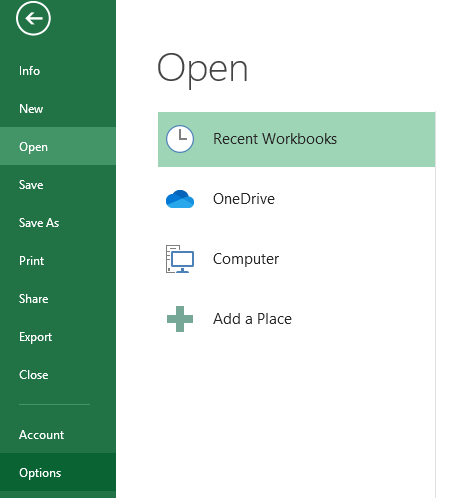How To Activate and Use The Inquire Tab?
In this article, we will learn how to activate and use the Inquire Add-in which is an inbuilt add in for Excel use.
Benefits of the Inquire add-in
Let us understand what an Add-in is.
It allows you to extend Excel functionality across other platforms including Windows, Mac, iPad, and in a browser. Use Excel add-ins within a workbook to. Interact with Excel objects, read and write Excel data.
We can create the Excel Add-in from an Excel file itself which has some special functions which you feel are useful to other Excel files.
When we create an Add-in it is created in .xlam format. Many Excel add in’s are downloaded from web with special functions to be used locally in you Excel files.
How To Add The Inquire to the Worksheet?
I will guide you how to use or import the Inquire Add-in to Excel file:
Open the Excel file in which you want the Add-in to be used.
Click FILE at the top left from Excel file.
Click Options at the bottom.

Click Add-ins.

Select the Inquire Add-in from the list that you want to use.

Then from the Manage select Com Add-in.

Click Go. Check Inquire and click go.

We are ready to use the inquire features now and it will be added to the toolbar.

Features of the Inquire addin
The inquire Add-in must have already been selected from the add-in options. Clicking the Inquire tab from Excel Tab will show these options:
- Workbook Analysis
- Workbook Relationship
- Worksheet Relationship
- Cell Relationship
- Compare Files
- Clean Excess Cell Formatting
- Workbook Passwords

Now let us see the changes we can do with the inquire tool:
Workbook Analysis
We can Analyze a lot about the worksheet and workbook using this options which will become handy to understand complex financial worksheets.
Go to the Excel ribbon and click Inquire tab. From the tab click Workbook Analysis button.

The “Workbook Analysis Report” tool creates a report that shows all the objects and properties of the workbook, such as worksheets, named ranges, formulas, and charts. This report is useful for auditing the workbook and identifying potential issues, such as broken links or circular references. The report can be customized to include or exclude specific objects or properties.
We will see these options.

Let us run the results and check.

This is how the example result of workbook analysis looks like.
Workbook /Worksheet Relationship
We can inquire a lot about the worksheet and workbook using these options which will become handy to understand complex financial worksheets.
The “Worksheet Relationships” tool generates a visual diagram that shows the relationships between the current worksheet and other worksheets in the workbook, including links, formulas, and data sources. This tool is useful for understanding the dependencies and interactions between different worksheets, and identifying potential issues, such as circular references or inconsistent data. You can customize the layout and appearance of the diagram to suit your needs.
Compare Files
When we are working on a file with daily changes and sometimes we might need to revert some wrongly applied changes and we don’t know what we changed then we can easily check the old file with new file using compare files.
We will use the Compare Files to compare 2 files now. Lets click Compare Files button and select two files which you want to compare:

Clicking compare will give results like this:

So we can clearly see the differences highlighted in green.
Now we can also export this differences report using the export button.
Again, you can also check the difference’s in detail by checking the color details. This is help you to reconcile the file back to original as per the requirements.
Clear Extra formatting
The “Clear Excess Formatting” tool analyzes the worksheet and identifies the cells that have unnecessary or unused formatting, such as background colors, font styles, or border lines. This tool is useful for optimizing the size and performance of the worksheet, and improving the readability and clarity of the data.
Sometimes the size of the file becomes excessively large and we can remove the extra formatting using inquire Add-in easily.
Let us see the file with excess formatting.
Now, use the option in inquire tab: “Clean Excess Cell Formatting”.

The end result with all borders and colors removed.
You can choose the specific types of formatting to be cleared, such as cell borders, fill color, font color, font size, and more. You can also choose to apply the formatting changes to the entire worksheet or to a specific range of cells.
Once you’ve made your selections, click “Clear Excess Formatting” to remove the unnecessary formatting from the worksheet.




Leave a Reply